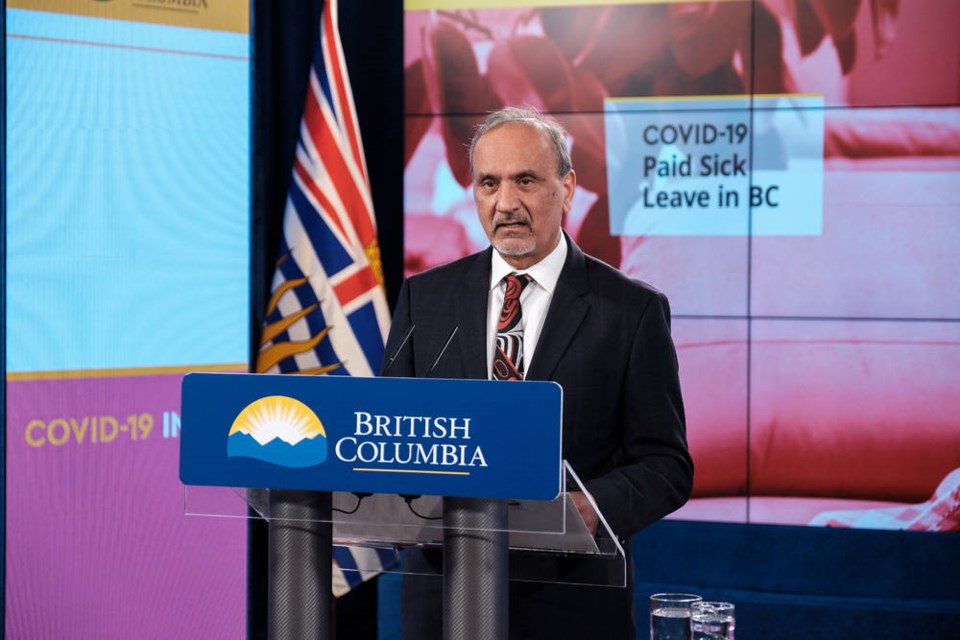One of the big permanent changes in the post-pandemic world started taking shape on Tuesday.
Paid sick leave for all employees – not just those with generous employment contracts – is being legislated.
It landed Tuesday in the legislature in the form of an amendment to employment standards law. But it’s actually a major public health measure that will last long after the pandemic is contained.
Employees have always been routinely told to stay home if they are sick, but those directives were just as routinely ignored by countless people. One of the big reasons, for lower-wage employees, was the cost. Doing the right thing for the greater good costs them badly needed wages.
When COVID-19 struck, the stay-home advice turned from an old bromide into a potential life-or-death decision.
The legislation won’t guarantee virus-free workplaces, but it will encourage more people – particularly hands-on service industry staff who can’t work from home - to book off if they feel sick.
It will be hard to measure direct benefits from the change, but it could make a big long-term difference in public health.
The bill comes in two parts. The first secures three days paid sick leave for anyone citing COVID-19 reasons, such as symptoms, self-isolation protocols or waiting for test results. Employers who don’t now provide such a benefit will have to do so starting next month and for the rest of 2021. They will file paperwork with WorkSafe B.C., which will reimburse them with funds from the government, up to $200 per day per employee.
The second part is designed for life after COVID-19. It’s a vague commitment to extend paid sick leave on a permanent basis starting next year, with the number of days and the dollar values to be determined. Another crucial detail — whether that leave will also be covered by taxpayers — was not specified on Tuesday.
The government estimates that half the employees in B.C., just over a million workers, don’t get paid sick leave, so the new policy is a big one.
Labour Minister Harry Bains said it’s hard to estimate the cost. But for the immediate program, if 60 per cent of the eligible workers take the new benefit, it would cost taxpayers $300 million this year.
That’s likely a high estimate, given the vaccinations are steadily shrinking the pool of people who might need days off.
A cost estimate for the permanent program starting next year wasn’t available.
The change amounts to a patch job on a federal program that Premier John Horgan lobbied extensively for, but is coming up short of expectations.
The Canada Recovery Sickness Benefit is hard to access, said Horgan. He expected improvements in the recent federal budget, but no changes were made.
He said Ottawa allocated $2.6 billion for that national sick leave program, “but have only been able to get $400 million out the door.”
That reflects poor design, not a lack of need, he said.
Nonetheless, B.C.’s new program will link with the federal effort, so workers can get three days leave covered provincially and potentially up to four weeks covered federally.
The federal sick leave extends to the self-employed, who weren’t mentioned in the outline of the B.C. program.
Horgan said he’ll continue to push for a better national program. “ This is a challenge that I think is best handled at the federal level, and I’m going to continue working with the prime minister to try and convince him and my colleagues across the country that this is something we need to do now.”
But the B.C. sick leave plan undercuts that. He’s rushed in to fill a need he feels Ottawa didn’t handle properly, so it takes pressure off the federal Liberals to respond.
The new paid sick leave builds off changes made last year to give workers unpaid personal leaves and unpaid leave for pandemic reasons.
Those passed quickly through the legislature unanimously.
Liberal critic Mike de Jong offered one observation during that debate that might come back into play.
He said he hoped that at some point in the future there would be a review of “whether the provisions have acted in the way intended or whether there have been unintended consequences from the provisions here.”
lleyne@timescolonist.com



